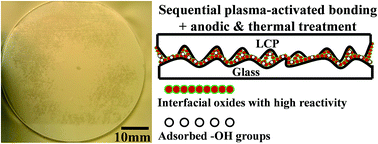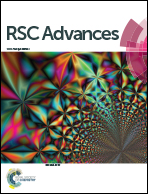Direct bonding of liquid crystal polymer to glass†
Abstract
In this paper, a direct bonding technology for liquid crystal polymer (LCP) and glass is developed for the first time by using sequential plasma-activated bonding which is based on physical sputtering followed by the formation of chemically reactive surfaces. The sequential-plasma-activated surfaces of glass and LCP show high hydrophilicity with moderate roughness. The adhesion between the activated LCP and glass surfaces is governed by hydroxyl group-mediated interfacial Si–OH–C covalent bonds. The post-bonding anodic treatment increases the amount of interfacial oxides by generating more singly-bonded oxides on the glass surface. The post-bonding thermal treatment rearranges the plasma-induced reactive sites and improves the conformal contact between the LCP and glass. A high bonding strength of 6.3 MPa is obtained between the LCP and glass when both anodic and thermal treatments are used. This simple and low-temperature direct bonding process for LCP and glass provides insights for future bonding between polymers and thin glass films.


 Please wait while we load your content...
Please wait while we load your content...